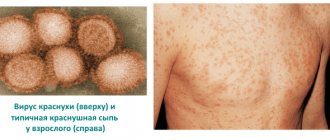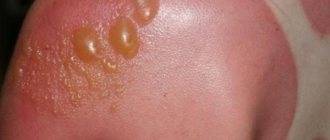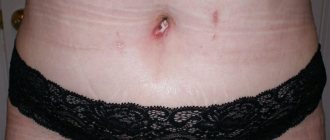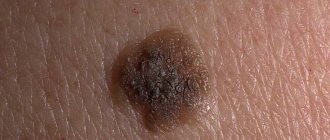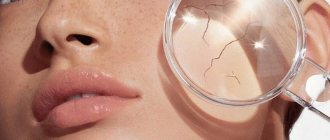Everyone experiences itchy skin. The skin may be very itchy and itchy, but the rash may not be detected.
It may seem strange and surprising, but this condition is common. It causes a lot of problems and can cause depression and sleep disturbances.
Itching and scabies can be observed in different parts of the body - from the head to the soles of the feet.
It is worth considering that symptoms may indicate the development of a pathological process that can be life-threatening.
Causes of itching at night not related to diseases
Most often, a person begins to itch at night for reasons that are not related to the development of any pathological condition in his body or the exacerbation of a chronic disease. Among the factors contributing to this process are:
- seasonal dry skin associated with changing climatic conditions, when hands or other open areas of the body itch;
- insect bites, especially mosquitoes and bedbugs, which can be found in the bedroom, bedding and feed on humans, irritating epithelial tissues;
- an allergic reaction to external irritants, in most cases accompanied by a rash that goes away after contact with the allergen is eliminated.
Diseases as etiological factors of night itching
Why does your body itch when you go to bed?
The cause may be diseases of the internal organs. Often itchy sensations in the evening and during sleep occur as a result of damage to the human body by infectious agents or chronic diseases of the internal organs, including:
- liver pathologies, which are accompanied by cholestasis and intoxication (hyperbilirubinemia often leads to yellowing of the skin and itching);
- hereditary xeroderma or increased dryness of the skin, which leads to night itching without characteristic rashes;
- chronic renal failure, when patients experience discomfort in different parts of the body, significantly disrupting a person’s well-being and sleep;
- endocrine pathological conditions, in particular diabetes mellitus, dysfunction of the thyroid gland, in which a person experiences an imbalance of hormones and associated metabolic disorders;
- parasitic infections, as one of the causes of intoxication of the body and skin itching;
- disorders of a psychoneurological nature, leading to activation of the parasympathetic nervous system, which is responsible for the occurrence of itching throughout the body;
- blood diseases, as a factor in the development of severe itching, which is permanent.
The mechanism of the problem, and whether the body can itch from nerves
The integumentary system has the most nerve endings. Therefore, any experience is reflected primarily on the skin. Remember how we turn red or pale when we are worried, how we become covered in spots from anger.
Nervous breakdown and sleep disturbances are the main causes of psychosomatic scabies. Other reasons:
- strong emotional shocks;
- psycho-emotional and physical fatigue;
- disrupted work and rest schedule;
- chronic stress;
- pathologies of the nervous system;
- fears and phobias;
- panic attacks;
- shock;
- depression.
The risk group includes people with increased emotionality and mental instability. Separately, it is worth noting the predisposition to scabies in women and children (unstable psyche, hormonal changes, increased emotionality). Also at risk are people who are not used to coping with mental fatigue.
Who is susceptible to nervous scabies:
- women during pregnancy;
- teenagers;
- people with mental disorders.
This is interesting! From a medical point of view, scabies can develop due to blood clots and medications.
External and internal provoking factors
Each person has his own limit of psychological tolerance and his own speed of response to stress. Therefore, scabies can be a delayed reaction to seemingly past and resolved difficulties. Any changes in a person’s life and thinking can become a provocateur. The reaction depends on psychological stability: someone will fall into hysterics if they don’t find their favorite coffee in the store, while others will be able to endure the death of a loved one with dignity.
External factors of scabies:
- change of place of residence or work;
- divorce and relationship discord;
- birth of a child;
- death or illness of a loved one;
- conflicts in the family, at school or at work;
- financial difficulties.
Internal factors:
- increased anxiety;
- tendency to self-examination;
- guilt;
- high expectations;
- excessive self-criticism.
Signs of nervous scabies
If scabies arose solely due to nervousness, then the diagnosis will not reveal the presence of a mite and its activity. And these marks will not be noticeable on the skin.
Nervous scabies, symptoms:
- hyperemia (redness caused by increased pressure in the vessels in a certain area);
- spots;
- rashes and blisters-like blisters;
- decreased performance;
- fatigue;
- swelling;
- general malaise;
- fever;
- hyperthermia;
- increased arousal and tension;
- mood swings.
Nervous scabies most often affects such parts of the body as the head, legs, arms, face, and anus. If scabies is caused by an infestation of mites, rashes first appear on the wrists and between the fingers. If scabies is caused solely by nervous tension, then the first symptom is itching.
How to distinguish nervous itching from other skin diseases
With nervous itching, a depressed and hysterical state of the client is observed. He often snaps at people or looks like he is about to lose his temper. If medical diagnostics do not reveal a subcutaneous mite, then there is a high probability of illness due to nervousness.
However, the manifestations of scabies are similar to dozens of other skin diseases. In order to differentiate the diagnosis, you need to visit a specialist. It is almost impossible to do this on your own. After all, other diseases, like scabies, can worsen after stress.
It is important! You cannot make a diagnosis and prescribe treatment on your own. Incorrectly selected medications will only further weaken the immune system.
What is the reason for the nocturnal intensification of the symptom?
The reasons for the increase in itching sensations in the evening and at night at the moment remain not fully understood. Presumably, the true culprit in the development of skin itching at night is a disruption in the normal functioning of a person’s so-called “internal clock” or, as scientists would call it, a circadian rhythm disorder.
Itchy skin at night can also be triggered by natural processes that occur with each of us during the period of falling asleep and sleeping:
- as you know, in the evenings the skin temperature rises slightly, as a result of which the production of enzymes in its thickness increases, contributing to the development of discomfort and unpleasant sensations;
- during and immediately before people go to bed, the pain sensitivity threshold decreases, which causes a more acute perception of itching sensations;
- in the dark, the activity of the parasympathetic nervous system, which is responsible for itching at night, increases;
- At night, the skin loses more water than during the daytime, which causes dryness of the epidermis and an increase in the influence of external irritants on them.
Sometimes one of the provoking factors contributes to the fact that the body itches at night. But more often such discomfort is associated with the activation of several processes at once. Only by normalizing the correct daily routine, as well as ensuring a good night's rest, can a person count on eliminating pathological sensations and improving the quality of his life.
What do folk beliefs say?
Itchy buttocks
There are many folk superstitions about why one or another half of the butt itches. It is believed that this speaks of some upcoming event. The gender of the owner of the itchy buttocks and his marital status are also important:
- A sign if the bride’s buttocks itches. Left - there will be many children in the marriage, right - you should get to know the groom well before marrying him: he may have problems with alcohol.
- A sign for a free woman (girl). If one of the buttocks itches, this may indicate: the left one - about an upcoming date with an interesting young man (man), about a beneficial period for marriage. It is believed that if you knock on the window glass during an itch and say the man’s name, he will have a significant impact on the lady’s fate. The right one is about unpleasant news, futile vanity, unsuccessful resolution of some matter, excessive expenses, gossip, quarrels due to jealousy. You should not borrow money or buy expensive things during this period.
- A sign for a married lady. Why is my left buttock itching? To a new surge of feelings and romantic relationships between spouses, the transition of marriage to a new stage. Why does the right one itch? To bad news, a visit from an unpleasant person.
- A sign for a free man. If one of the buttocks itches, this means: left - heavy loads are expected at work. But if the work is done efficiently, management will notice and appreciate it. We need to plunge headlong into everyday work. Why does the right one itch? To troubles in the service. Do not argue with your superiors, so as not to be fired or transferred to a lower position. If you are planning a business trip, try to avoid it. Possible monetary loss. Don't buy lottery tickets or gamble.
- A sign for a married man. The left half of the butt, like that of married women, itches for a new outbreak of feelings in marriage. Why is your right buttock itching? In addition, the same as for unmarried men.
If both buttocks itch, then for free men and women this means: weak itching means fun, strong itching means problems. For married men - to difficulties both at work and in the family, for married women - to routine, useless bustle, and the arrival of multiple relatives.
Diagnostic features
If your whole body itches at night, it is better not to ignore such a symptom, but to seek qualified help from a doctor. As a rule, the problem of itching all over the body, which manifests itself mainly at night, should be dealt with by a specialist in a narrow field of professional activity. Depending on the reasons for the development of the pathological condition (for itching of neurogenic origin - a psychotherapist, for diseases of internal organs - a therapist, for an infectious skin lesion or allergy - a dermatologist, etc.).
Diagnosis of body skin itching at night may include various examinations to determine the true causes of the pathological condition. A more detailed plan is drawn up by the attending physician, based on the clinical features of the disease and the nature of its course.
Measures to improve the condition
To get rid of itchy skin, a person should consult a doctor and determine the main reason why the whole body itches, especially at night. After a high-quality diagnosis and clarification of the nature of the disease, specialists will recommend the patient a course of treatment for the underlying ailment, which will simultaneously eliminate night discomfort.
If your body itches for no apparent reason, then simple tips will help you get rid of the discomfort, including:
- air humidification in rooms with a dry microclimate, which will prevent the loss of excess moisture from the skin and eliminate the discomfort associated with this process;
- At times, people are helped to eliminate excessive dryness of the skin by warm, soothing baths, as well as by using baby soap instead of regular soap;
- Wet bandages will allow a person to forget about the strong, pronounced itching and sleep peacefully;
- in the case of the allergic nature of the condition, which is accompanied by the body itching in different places, it is necessary to remove from the bedroom all sorts of things that can provoke the development of hypersensitivity of the body (most often these are indoor plants, soft toys, scented candles);
- if the body is itchy, you should improve the quality of your diet, do not drink carbonated drinks, give up bad habits and chocolate, and also limit contact with pets;
- Often a person’s hands itch at night after working with household chemicals, so by eliminating this factor in the development of itching, you can count on an improvement in the condition;
- if your head itches, you should try changing the shampoo or using anti-seborrhea products;
- sometimes to disappear itching sensations it is enough to stop being nervous, calm down and try to relax or take a sedative before going to bed;
- if your hands or other parts of the body itch, you should not scratch them, as such actions can cause infection to attach to the affected areas;
- It is better to avoid contact with synthetic fabrics, as they can increase nighttime itching.
A healthy night's sleep is very important for a person. It is its quality that determines how the working day will go, what your mood and well-being will be. Therefore, you should not ignore discomfort in the form of itching, which prevents you from falling asleep when going to bed. Remember, as soon as you begin to experience unpleasant sensations, you must immediately seek advice from specialists who will help establish the true nature of the disorder and recommend the most effective option for its treatment.
Prevention of nervous scabies
To avoid itching from nerves, use the means at hand:
- herbal teas and plant-based pharmaceutical products (motherwort, valerian, mint, chamomile);
- baths with aroma candles and herbal infusions;
- breathing exercises;
- daily exercise (20–30 minutes a day);
- meditation and yoga.
It is important to maintain a work-rest schedule, get enough sleep (7-9 hours), and monitor your diet. Avoid overwork and fuss. Develop self-control and increase stress resistance.
It is important! If signs of scabies or other psychosomatic problems appear, contact a psychologist immediately. Without treatment and psychocorrection, the condition will take a chronic form.

